Share

Back to Blue by Economist Impact
Limiting forever chemicals in drinking water
On March 14th 2023 the US Environmental Protection Agency (EPA) announced a proposal to establish legally enforceable levels for six types of ‘forever chemicals’ known as per- and polyfluoroalkyl substances (PFAS). It is expected to prevent thousands of deaths and reduce tens of thousands of serious illnesses attributable to PFAS.
The rule would require public water systems to monitor PFAS levels, notify the public of these and reduce them if exceeding the proposed standards. Developed over several years and grounded in the authority that the EPA has from US Congress, through the Safe Drinking Water Act, the goal is to issue a final PFAS drinking water standard by the end of 2023 or early 2024. This will result in a standard to which all water systems in the US must adhere.
Sarah Doll, national director for Safer States, an NGO fighting pollution, speaks to Naka Kondo, the lead editor of Back to Blue about the significance of the EPA proposal to limit PFAS in US drinking water - and what needs to happen next.
Follow the Back to Blue series for more podcast episodes, or visit backtoblueinitiative.com for more content.
Back to Blue is an initiative of Economist Impact and The Nippon Foundation.
More episodes
View all episodes
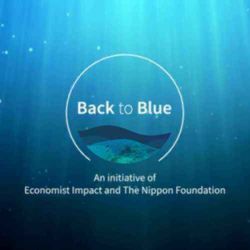
Ensuring the role of science in the plastics treaty: insights from Global Plastics Summit
17:05|At our inaugural Global Plastics Summit held on Oct 11-12th in Bangkok, Naka Kondo, the lead editor of Back to Blue Initiative spoke to Winnie Lau, project director, preventing ocean plastics at The Pew Charitable Trusts and Margaret Spring, chief conservation and science officer and Monterey Bay Aquarium. They discussed their impressions of the summit, and shared their recommendations and aspirations for the role of science and evidence in the treaty moving forward. Follow the Back to Blue series for more podcast episodes, or visit backtoblueinitiative.com for more content.Back to Blue is an initiative of Economist Impact and The Nippon Foundation.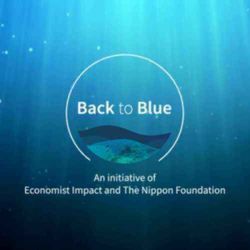
Boosting ocean life's resilience to human impact - a conversation with Azul Bio
22:29|Back to Blue’s lead editor, Naka Kondo speaks to Ben Alva, the founder of Azul Bio, a startup developing microbiome-based treatments and probiotics from nature that give ocean lifeimmunity to human impact, such as coral resilience. They are planning their first pilot in November.Follow the Back to Blue series for more podcast episodes, or visit backtoblueinitiative.com for more content.Back to Blue is an initiative of Economist Impact and The Nippon Foundation.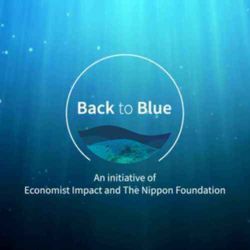
Ocean Census: Species discovery at speed and scale
22:22|Charles Darwin once dismissed the ocean as a ‘tedious waste, a desert of water.’ Some of his contemporaries disagreed. The brave Challenger expedition of the 1870s set out to discover what lurked beneath, traversing over 100,000 kilometres and discovered 4,772 specimens, from sea snails to snake eels, discovered the deepest trench on earth, and toppled false assumptions about the lack of life under the waves. Over a century later, the Census of Marine Life picked up the baton. An eighty-country collaboration, with 2,700 scientists, the project identified another 6,000 species. Yet even these numbers are a literal drop in the ocean. Oliver Steeds, Ocean Census director and chief executive of Nekton, a UK-based marine science and conservation institute, speaks to Naka Kondo, the lead editor of Back to Blue initiative about a new mission, the Ocean Census, launches this year with a far greater ambition: to find at least 100,000 new marine species in its first decade.Follow the Back to Blue series for more podcast episodes, or visit backtoblueinitiative.com for more content.Back to Blue is an initiative of Economist Impact and The Nippon Foundation.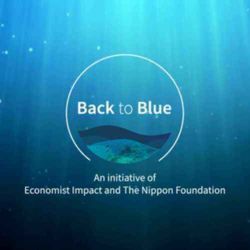
The Great Bubble Barrier
11:49|Back to Blue's lead editor, Naka Kondo speaks to Anne Marieke Eveleens, co-founder and chief strategy officer of the Great Bubble Barrier, a Dutch social enterprise, about how air bubble technology can help clear plastics from our rivers.Follow the Back to Blue series for more podcast episodes, or visit backtoblueinitiative.com for more content.Back to Blue is an initiative of Economist Impact and The Nippon Foundation.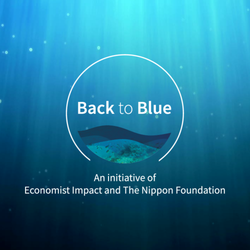
Takeaways from the World Ocean Summit 2023
19:43|The World Ocean Summit is an annual global event run by The Economist Group, which brings together the wide ocean community, from business and finance to governments, national and international policy-makers, civil society and academia. This year, we celebrated the 10th anniversary of this event in Lisbon, Portugal.In this episode, Martin Koehring, head of the World Ocean Initiative at Economist Impact, shares his firsthand experience at the summit and his key takeaways, with Naka Kondo, lead editor of Back to Blue at Economist Impact.Make a submission at backtoblueinitiative.com/take-action-on-ocean-pollution to close the marine pollution data gap.Follow the Back to Blue series for more podcast episodes, or visit backtoblueinitiative.com for more content.Back to Blue is an initiative of Economist Impact and The Nippon Foundation.
Peak plastics: bending the consumption curve
13:35|The world will continue to drown in plastic waste unless a bold and comprehensive set of policy changes is applied – this is according to Peak plastics: bending the consumption curve – a new report by Back to Blue, an initiative of Economist Impact and the Nippon Foundation. We delve into how we can decisively tackle plastic waste that is polluting our ocean and land environments with guest, Winnie Lau, project director of the Preventing Ocean Plastics project at The Pew Charitable Trusts. What will it take to decisively tackle the plastic waste crisis? Can we bend the consumption curve?Download the Peak Plastics report at: https://backtoblueinitiative.com/plastics-consumption/Follow the Back to Blue series for more podcast episodes, or visit backtoblueinitiative.com for more content.Back to Blue is an initiative of Economist Impact and The Nippon Foundation.
Ocean Acidification: A crisis in the making
41:20|The UN’s Sustainable Development Goal 14, Target 14.3, calls for minimising and addressing the impacts of ocean acidification through co-operation at all levels. There is an urgent need for scientific communities to come together with the media, education systems, policymakers and civil society to help bring more attention to the issue and to come up with technological solutions and robust legislation.Listen to the panel discussion on ocean acidification by Steve Widdicombe, director of science, Plymouth Marine Laboratory, Peter Thomson, United Nation Secretary-general's special envoy for the ocean, Malaika Vaz, explorer, National Geographic, and Founder, Untamed Planet and moderated by Charles Goddard, editorial director, Economist Impact.Learn more about ocean acidification at: https://backtoblueinitiative.com/ocean-acidification/Follow the Back to Blue series for more podcast episodes, or visit backtoblueinitiative.com for more content.Back to Blue is an initiative of Economist Impact and The Nippon Foundation.
Deep sea mining and ocean pollution (part 2)
28:32|In the second part of this podcast on deep sea mining, released during the World Ocean Summit Asia-Pacific, we dive deeper into the pollution risks of deep sea mining with Craig Smith, deep sea ecologist and professor emeritus at the University of Hawaii at Manoa. How has deep sea mining emerged as a sector and where are things standing today with this industry?In part 1 of this 2-part episode, we discussed the environmental impact of deep sea mining on our oceans and marine life, and it being an issue on the COP agenda, listen to the previous episode on the Back to Blue website: https://backtoblueinitiative.com/back-to-blue-podcasts/ Register to attend the World Ocean Summit Asia-Pacific at: https://events.economist.com/world-ocean-summit-asia-pacific/ Follow the Back to Blue series for more podcast episodes, or visit backtoblueinitiative.com for more content.Back to Blue is an initiative of Economist Impact and The Nippon Foundation.